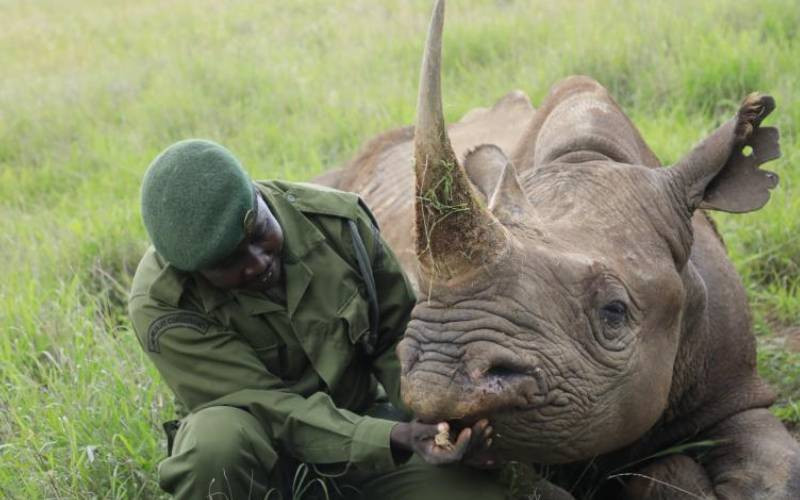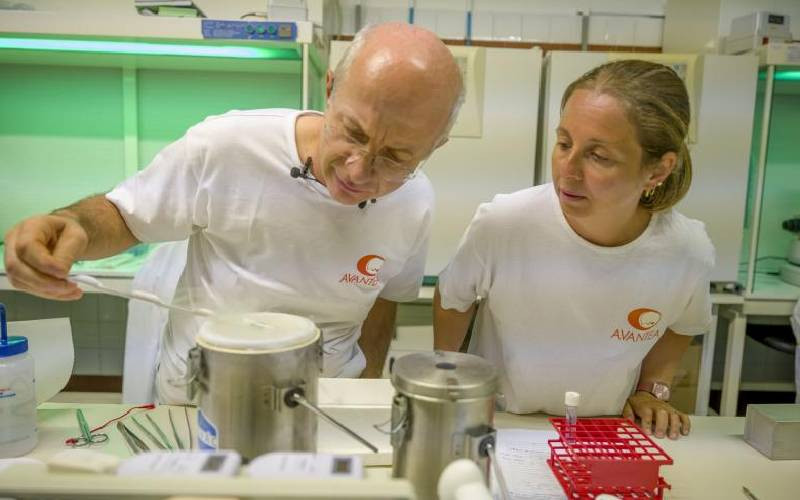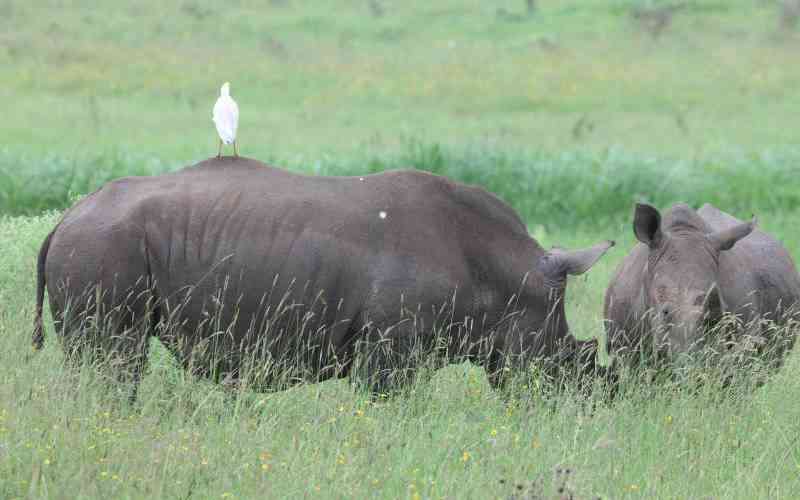By Jacob Ng’etich
Grazing in the lush and dense thicket at the hills of Parpeles that overlook the Lewa Ranch in Laikipia County are two white endangered rhinoceros.
The carcass of Omni their third companion throws a pungent smell near the Il Ngwesi Community Conservancy’s unattended airstrip.
Omni, the only black rhino succumbed to injuries sustained from a poisoned spear stab on its back within the conservancy a month ago in what swirls anger in the villagers.
According to Head of Security Njeman Portoi at the Il Ngwesi Omni ran down growling unlike other days but they did not anticipate that it had been attacked.
“It was unusual but we thought maybe he was angry; little did we know that the orphan rhino donated by the Lewa Conservancy had been hurt in an poaching attacked,” said Mr Portoi. The Head of Security said poachers who hoped they would overpower it and bring it down after spearing it with a poisoned spear.
Friendly animal
“The animal that was friendly with human beings due to its upbringing at Lewa Conservancy, made it to the lower grounds just on time to be noticed before it died, it’s ivory was however intact,” said Portoi.
According to Mr Gabriel Nyausi, Greater Sera Region Coordinator, Northern Rangeland Trust (NRT), the 14-year-old bull had spent over 10 years at Il Ngwesi, its natural habitat after it was translocated from Lewa in 2002, and its presence was symbolic to the residence of Il Ngwesi, being among the only three rhinos to live on the land since the 1970s.
“It was sad that the poachers killed it when it had adapted to its natural habitat and was giving the residents hope of a possible increase in the herd, the old people say there were hundreds in the region before the 1970s,” said Nyausi.
“When you have such wild animals you have visitors coming from far and wide to get a glimpse and that means money to the local community and also employment opportunities through conservation,” said Nyausi.
Security Officer Diwani Parkulas said the devastation over the rhino’s killing provoked an outcry in the community, but also gave them a unity of purpose to proactively confront the poaching menace after all elephants have been felled before in their midst.
An in a move likely to create precedence across the region, the community elders of Il Ngwessi, with assistance from NRT, Kenya Wildlife Services officers, Lewa and Borana Conservancy immediately launched an investigation.
Mr Leiten Kiperus, a Security Officer in the Conservancy who first tumbled on the carcass of Omni said the elders meeting in the villagers meeting in mid April, where those involved in the killings were given 10 days to confess or be cursed. “The community was unhappy and vowed not to relent until those who participated in the heinous act were punished,” said Kiperus.
On April 24, the date of the second community meeting, Amayo Shwel, Ramson Legei, Kamung Nyausi and Misiiya ole Kaunga, confessed they participated in the planning and killing of Omni.
Stay informed. Subscribe to our newsletter
And when the four poachers were taken to court an even bigger surprise awaited them, as the Judge declared each pay Sh4 million bond for their release, making it historically the highest amount ever in respect of poaching in the country.
Deep pride
“The enraged community members felt relieved. Though the animal had died those who killed it were going to pay for it,” said Portoi.
Nyausi explained that the entire investigation was a community-led initiative, using the arm of the law alongside a traditional cultural approach to expose the culprits within this small society.
“The entire process has been driven by the community’s deep pride in Omni, recognising the benefits he attracted through tourism, given the sensitisation from Northern Rangeland Trust NRT and a desire to see an expanding rhino population thrive on Il Ngwesi,” he said.
According to Ms Sophia Mwendwa the Senior Administrator NRT, Il Ngwesi, the first community-led conservation initiative set up by the organisation in Northern Kenya, with a vision to sustainably manage the environment both for grazing of livestock and wildlife conservation.
“We have previously raised funds for the conservancy alongside others, which we use to train the community around on the importance of taking a proactive stance in ending the poaching menace,” said Mwendwa.
Mwendwa said much of their participation was to support a wide range of trainings and also helps broker agreements between conservancies and investors who would like to invest in the region in a bid to improve the lives of the people.
The organisation that was established in 2004 with a purpose to develop ways on how the locals could benefit from a blend of sustaining wild life and livestock as means of transforming their lives, has played a role in securing peace and conserving natural resources and is currently overseeing 26 conservancies in the region.
“We have 26 conservancies under us that bring together over 200,000 members from several communities in the region, and our organisation is now widely seen as a model of how to support community conservancies,” said Mwendwa. She lauded the community for taking the initiative of arresting the poachers, a move that has been emphasised by the organisation during its community outreach meetings.
Dr Mordecai Ogada, the Laikipia Wildlife Forum said the bond given to the poachers was a sign of the appreciation of the challenge that was been caused by poaching in Kenya that has threatened to decimate the targeted animals in the country.
Government serious
“This is an encouraging sign that the Government is taking poaching crimes seriously. We hope this judgment will set a precedent and become a serious deterrent against poachers. Wildlife crime it seems will no longer go unpunished. We congratulate the elders of the Il Ngwesi community for showing initiative and leadership,” said Ogada.
 The Standard Group Plc is a
multi-media organization with investments in media platforms spanning newspaper
print operations, television, radio broadcasting, digital and online services. The
Standard Group is recognized as a leading multi-media house in Kenya with a key
influence in matters of national and international interest.
The Standard Group Plc is a
multi-media organization with investments in media platforms spanning newspaper
print operations, television, radio broadcasting, digital and online services. The
Standard Group is recognized as a leading multi-media house in Kenya with a key
influence in matters of national and international interest.
 The Standard Group Plc is a
multi-media organization with investments in media platforms spanning newspaper
print operations, television, radio broadcasting, digital and online services. The
Standard Group is recognized as a leading multi-media house in Kenya with a key
influence in matters of national and international interest.
The Standard Group Plc is a
multi-media organization with investments in media platforms spanning newspaper
print operations, television, radio broadcasting, digital and online services. The
Standard Group is recognized as a leading multi-media house in Kenya with a key
influence in matters of national and international interest.








